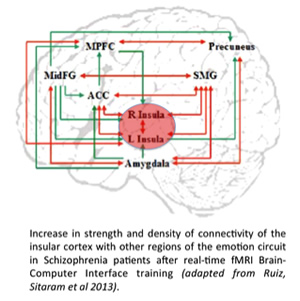Brain imaging in neuroscience adopts experimental paradigms correlating a particular behavioral manipulation as an independent variable and recording the brain responses as dependent variables. Novel approaches developed in Dr. Ranganatha Sitaram’s laboratory incorporate a complementary philosophy where brain activity is noninvasively manipulated as an independent variable to observe the causal effects on behavior. To develop such methods Dr. Sitaram and his co-workers have applied state-of-the-art techniques in brain signal acquisition, including, real-time versions of functional imaging methods, such as fMRI, fNIRS, EEG/MEG. They have combined these techniques with advanced experimental paradigms of neuroscience and neuropsychology.
 Traditional approaches to diagnosing and treating neuropsychological and psychiatry disorders, such as depression, schizophrenia and other psychopathologies, have largely relied on subjective reports and behavioral observations of the patients, followed by pharmocological and cognitive-behavioral therapeuric interventions, with mixed results. Recent studies which applied innovative techniques in neural self-regulation and control are beginning to demonstrate that patients can be trained to modulate and correct abnormal brain leading to symptom improvements and behavioral changes.
Traditional approaches to diagnosing and treating neuropsychological and psychiatry disorders, such as depression, schizophrenia and other psychopathologies, have largely relied on subjective reports and behavioral observations of the patients, followed by pharmocological and cognitive-behavioral therapeuric interventions, with mixed results. Recent studies which applied innovative techniques in neural self-regulation and control are beginning to demonstrate that patients can be trained to modulate and correct abnormal brain leading to symptom improvements and behavioral changes.
One such study conducted by Dr. Sitaram and his collaborators, Dr. Sergio Ruiz and Dr. Niels Birbaumer, successfully applied real-time fMRI neurofeedback in Schizophrenia patients known to have disability for recognizing emotions in other’s face. Patients were trained to achieve volitional control of the anterior insula cortex, a region critical for emotion processing. Following successful self-regulation training, patients recognized emotions in photographs showing disgust faces more accurately. Real-time fMRI training led to an increase in the number of the incoming and outgoing effective connections of the anterior insula. This study shows that patients with schizophrenia can learn volitional brain regulation by rtfMRI feedback training leading to changes in the perception of emotions and modulations of the brain network connectivity. These findings open the door for further studies of rtfMRI in severely ill psychiatric populations, and possible therapeutic applications.
The above study was published in the journal of Human Brain Mapping. Following this, the journal of Trends in Cognitive Sciences invited the authors to write a review article on real-time fMRI brain-computer interface and neurofeedback approaches. Increased interest in these methods encouraged the Dana Foundation to write an article called “The Neurofeedback Story.”
References:
Ruiz S, Birbaumer N, Sitaram R. Abnormal Neural Connectivity in Schizophrenia and fMRI-Brain-Computer Interface as a Potential Therapeutic Approach. Front Psychiatry. 2013;4:17. doi: 10.3389/fpsyt.2013.00017. Epub 2013 Mar 22. PubMed PMID: 23525496; PubMed Central PMCID: PMC3605516.
Birbaumer N, Ruiz S, Sitaram R. Learned regulation of brain metabolism. Trends Cogn Sci. 2013 May 7. doi:pii: S1364-6613(13)00082-X. 10.1016/j.tics.2013.04.009. Epub ahead of print] PubMed PMID: 23664452.
